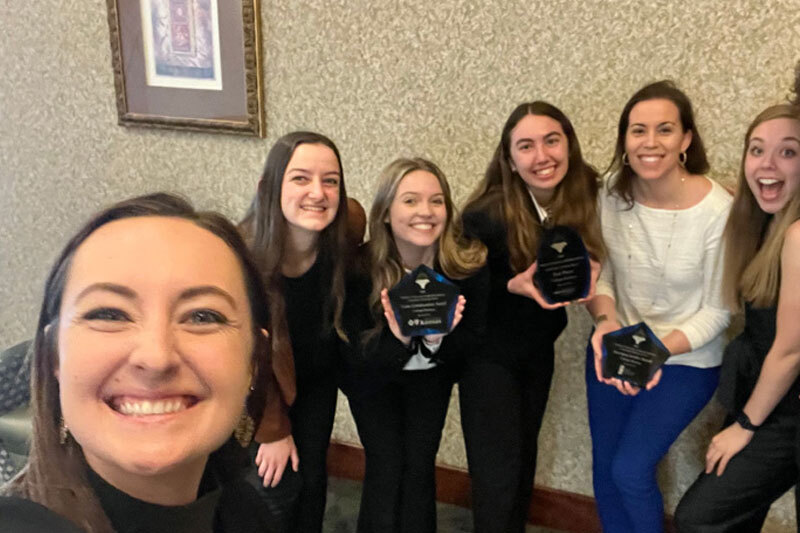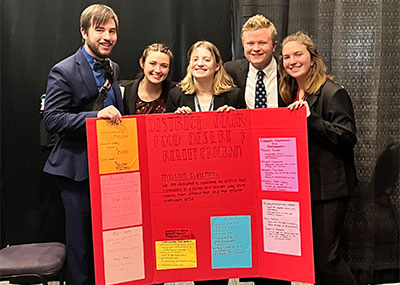
Read time:

Students from the President’s Leadership Program achieved huge success at the Leadership Challenge Event™ in Kansas, putting their skills to the test and receiving national recognition for their performances.
Two teams of five students traveled to Washburn University in Topeka, KS, to compete in the annual competition, which challenges students to apply the leadership aptitude they’ve acquired through their PLP classes and leadership training. The event is a full-day simulation experience that mirrors real-world social issues and challenges students tackle by applying their knowledge of leadership, management and team dynamics.
This year, the scenario was a grocery store fire that resulted in a community food desert. The students were tasked with working with stakeholders of the affected area to help tackle the problem. The teams were given individual roles on a task force, including social worker, city council member, transportation director and marketing publicist, and were charged with collectively developing and presenting a grant proposal that met the needs of the community and its leaders.
The PLP teams competed against 15 other college teams. In the end, Christopher Newport was the university called up most to collect trophies. In fact, one of the CNU teams received three of the five awards for which they were eligible. While the other team didn’t bring home a trophy, its members gained a plethora of experience and “displayed effective leadership and team effectiveness throughout the challenge,” said PLP Director Lacey Grey Hunter.
“From my perspective as a coach, it was amazing to see the progression of both of our teams’ group dynamics from start to finish. We spent about seven weeks before LCE™ training for the event, and students were really intentional about learning each other’s leadership strengths and weaknesses during the sessions,” said Victoria Carrico, PLP assistant director and team coach. “Each week, they improved their ability to share information and problem solve collectively. By the time they arrived at LCE™, they were a well-oiled machine.”
For the students who competed, the challenge was the culmination of all their hard work and focus. They said they were not only well-prepared for the event, but that what they learned during the simulation was invaluable and will bolster their skill sets as they use their leadership acumen to transition from college to careers.
“Learning about leadership in the classroom is one thing, but being able to actively participate and practice leadership in a real-world scenario is something completely different,” said Zack Kelly, ‘24 finance, who was captain of the winning team. “It gives you the opportunity to learn about yourself as a leader and how you act in certain situations, which I think is extremely important.”
Oline Hale, who led the second team, said the event was empowering, and a multi-faceted learning experience.
“LCE™ was nothing like my team had experienced before. It provided an opportunity to practice and grow in our leadership skills through a pressure-filled challenge,” said Hale, ’25 leadership and theater. “This opportunity allowed my team to push ourselves in a way that, in the real-world, would have high stakes connected to it. It provided us with the stress of a “real-world” scenario, without the stake of damaging the livelihood of actual people. This was an invaluable experience because many leaders are not given this sort of training.”
Learning to problem-solve as a team was also a great experience. “I think our diversity of thought, combined with our ability to compromise, made us especially effective. We all saw things from different perspectives, which normally causes havoc, but in our case, we were able to use it to our advantage,” Kelly said.
Hale said her team “brought energy, passion and a diverse set of skills that we utilized to make the best decisions we could.”
“We had a creative way of looking at problems and were able to come up with creative solutions,” she said. “We care about each other and because of that, we were able to work well together and utilize each member’s unique skill sets.”
Both Kelly and Hale believe the competition provided them with useful insight about their leadership styles and strengths.
“During the event, I learned that I am strong in my understanding of empathy, and I am adept in stepping into an advocacy role, especially when it comes to advocating for people’s needs that are usually missed or ignored,” Hale said.
The time constraints put on the teams during the scenario, Kelly said, proved to him how well he can operate under pressure.
“This event is extremely time sensitive, so one thing I learned about myself is that I’m very decisive,” he said. “I was able to pick one approach and stick with it, rather than spend my time worrying about other possible solutions.”
The LCE™ and other similar events are intended to support PLP’s mission to shape students into well-rounded leaders during their four years at Christopher Newport. The more real-world applications of leadership the students experience, the more dimension they gain.
“Athletes, musicians, and actors are often successful because they practice, practice, practice. Furthermore, they review film and integrate changes into their practice with the goal of becoming the best at their trade,” Hunter said. “Leadership is similar in that practice is critical to developing the skills society demands of leaders: navigating ambiguity, responding to change and decision making to name a few.”
Being part of PLP has meant discovering a new definition of leadership, Hale said.
“Before coming to CNU, I thought leadership was just something that only a few finite people can do. I thought it followed a strict set of guidelines or consisted of some boxes to check,” she said. “Since coming to CNU, however, I have learned that anyone can ‘do leadership’ and that is a process where everyone has influence, even when it might not be obvious.”
Kelly said his time in PLP and the simulation have taught him that “leadership is a process.”
“It is not something that is determined by a title,” he said. “Another thing I have learned is that there are no leaders without followers, so putting others first and having trust in your followers is arguably the most important thing any leader can do.”